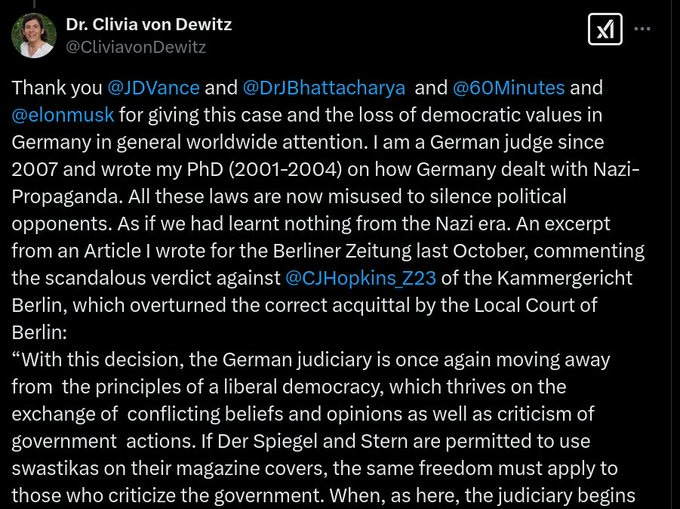Censorship in the EU: Hate Speech Laws Are Suffocating Free Speech
Europeans are increasingly afraid to speak their minds.
Draconian “hate speech” laws, a tool of authoritarian regimes, have crept into EU policies. How bad is it? Let’s break it down.
Police raids on people's homes for posting a meme, criminal charges for hate speech and posting misinformation - no longer a dystopian film or a glimpse from China or Russia, but reality in several EU countries. Especially in Germany, the EU's largest country, where the authorities have taken a particularly hard line on freedom of expression over the past decade. People are clearly afraid to speak their minds.
The proportion of Germans who feel they can express themselves freely has fallen steadily and has reached an all-time low in recent years. For the first time since the fall of the Berlin Wall, more people say they have to be careful about expressing their views (44%) than say they are still free to do so (40%).
The strong First Amendment protection of the US Constitution is not found in European constitutions, which are much more vague in their defence of free speech. Speech is generally protected, but as always, the devil is in the details - there are exceptions. This is why political ideologues in many European countries have been able to introduce 'hate speech' laws, which increasingly restrict freedom of expression.
German outgoing socialist Chancellor Scholz expresses this “nuanced acceptance of speech” in expressis verbis: “We have freedom of speech in Europe… What we do not accept is if this is supporting extreme right positions."
Furthermore, the EU has demanded that its member states criminalise 'hate crimes' in their legislation, but has clearly crossed the red line in doing so. The EU has no mandate to enforce criminal laws on member states, but this has not stopped EU bureaucrats from threatening those countries that do not comply with fines. Many have complied.
Germany has been particularly keen to prosecute its citizens for “hate crimes”, especially those committed on social media. Police raids on the homes of online commentators have become a new routine in Germany and are becoming more frequent. “Hate speech offenders” are charged with online incitement to hatred, defamation and insult. More than 2,000 politically motivated online crimes are recorded by the police every year. "We are making it clear that anyone who posts hate messages must expect the police to be at the front door afterwards," one high police official has commented.
But there are many voices in Germany who see such hate speech laws and state action as more than problematic. One of them is a courageous German judge, Dr Clivia von Dewitz, who has stated that: “/.../ all these laws are now misused to silence political opponents. As if we had learnt nothing from the Nazi era.” She cited the notorious case of satirist CJ Hopkins, who was prosecuted in Germany for an alleged hate crime over the cover of his book.
Moreover, the strong pressure on social media companies to set up a censorship apparatus also originated in Germany. The 'Network Enforcement Act' (NetzDG) was adopted in 2017 and has been taken up as a model by authoritarian regimes around the world, such as Russia, Belarus, Venezuela, Vietnam, Kenya, but also France, the UK, Australia etc.
Germany's NetzDG was also the model for the EU's infamous Digital Services Act (DSA), adopted in 2022, which is the basis for pressuring X, Facebook and others to censor users in the form of 'content moderation'. Otherwise, heavy fines (of up to 6% of their global turnover) will be imposed on companies that refuse to censor content the EU doesn't like, such as criticism of power over migration, climate alarmism, health, 'minorities', etc. X already refused to comply with such rules in 2023 and has been fighting with EU bureaucrats ever since.
Certain members of the European political nomenklatura have repeatedly declared their special eagerness to combat hate speech and disinformation. Speaking at the WEF 2024 meeting in Davos, President of the EU Commission U. von Leyen described it as the most important issue to tackle globally:
In his recent Davos statement, Spain's socialist Prime Minister P. Sanchez called for an end to anonymity on social media in order to combat "hate speech" more effectively:
The UN Secretary-General, the Portuguese socialist A. Guterres, has called for global action because digital technology is already causing serious damage - spreading hate and lies in the digital space, undermining public health and climate action, etc:
It is not surprising, therefore, that such views have captured many in Europe and have effectively found their way into 'hate speech' legislation. The result is a stifling of free speech in several European countries and a growing self-censorship. The EU's fight against disinformation began with a desire to prevent the propaganda of adversaries (China, Russia, etc.), but it quickly spread to other areas because it is incredibly easy to switch from fighting external enemies to censoring internal critics.
Censorship is always a slippery slope.







If any government crushes freedom of speech, it then gains the power required to control the people and do whatever it wants to them. This is the very reason freedom of speech was installed into the American Constitution nearly 3 centuries ago! Adams Madison Jefferson said he "had freedom of speech inserted in the 1st amendment because all the other rights are dependent on that right - if a government can silence criticism it has a license to commit any atrocity."
The EU has done a poll among EU citizens and the outcome is that about 65% of all Europeans are happy with the EU. Is it coincidence that this poll has been done in a time when it's clear that the support for the EU is declining? But more important: is it really true ? This poll has been done on behalf of the EU in Brussels, so this fact alone means that it's not independent. Would you chose a survey company which is not on your side ? If you look closely at the questions asked to the people, you can clearly see that the questions are stated in a way that the answer is likely to be in favor of the EU instead of against the EU. Example: "Taking everything into account, would you say that your country has on balance benefited or not from being a member of the EU". Respondents would think about the introduction of the Euro and the free borders, like I would do. But what is the expiry date of these ? What should be addressed in the questions asked should be related to recent issues, recent legislation, recent guidelines and demands. Brussels clearly proves to try to gain more and more control, taken away from its sovereign member states. Brussels is crossing the red line in this sense over and over again. If the survey would have been related to current and recent issues, the outcome would completely different and most probably showing a trend that more and more people are not happy with the EU anymore.